
About Andrew Cusack
 Writer, web designer, etc.; born in New York; educated in Argentina, Scotland, and South Africa; now based in London.
Writer, web designer, etc.; born in New York; educated in Argentina, Scotland, and South Africa; now based in London. read more
News
Blogs
Reviews & Periodicals
Arts & Design
World
France
Mitteleuropa
Knickerbockers
Argentina
The Levant
Africa
Cape of Good Hope
Netherlands
Scandinavia
Québec
India
Muscovy
Germany
Academica
Krummau on the Moldau
Český Krumlov Revisited
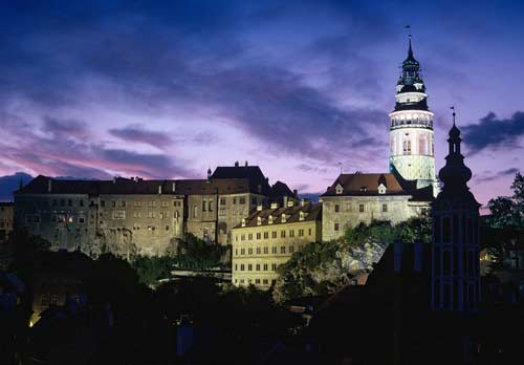
THE CASTLE OF Krummau in Bohemia stands majestically on its crag in a bend of the Moldau river, presiding confidently over the town below. Český Krumlov, as the town is known in the currently-reigning Czech language, began in the thirteenth century under the Rosenberg family and was purchased by the Emperor Rudolf II in 1602. Yet it was under the princely house of Schwarzenberg (proprietors of Krumau from 1719 to 1945) that the castle flourished. The name Český Krumlov means Bohemian Krummau, to differentiate it from a Moravian town of the same name. (It is also often rendered as Krumau or Krumau-an-der-Moldau).
While the advent of Communism deprived the Schwarzenbergs of this great castle and numerous other vast properties of theirs behind the Iron Curtain, the Schwarzenbergs have since regained their natural prominence in Bohemia. His Serene Highness Prince Karl VII of Schwarzenberg, Duke of Krummau, Count of Sulz, Princely Landgrave of Kelttgau currently serves his country as Minister of Foreign Affairs of the Czech Republic, as well as being a member of the Czech Senate which convenes in the Wallenstein Palace in Prague. For the sake of convenience, however, His Serene Highness goes by ‘Karel Schwarzenberg’.
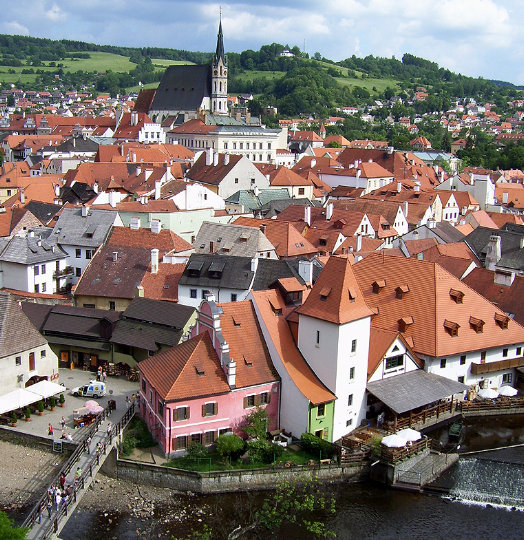
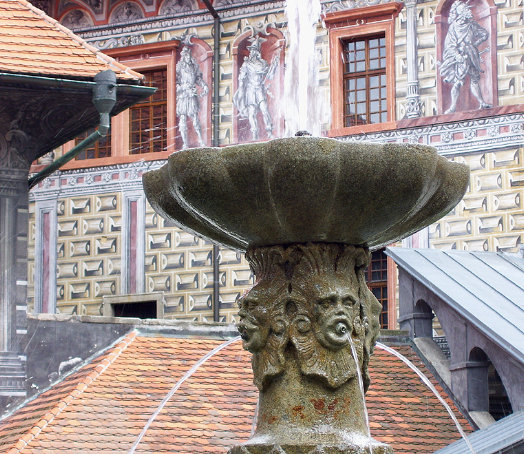
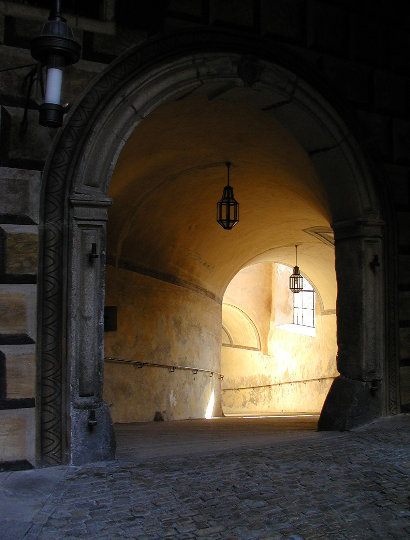
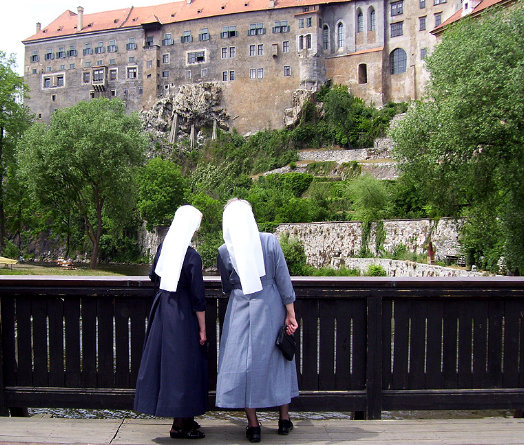
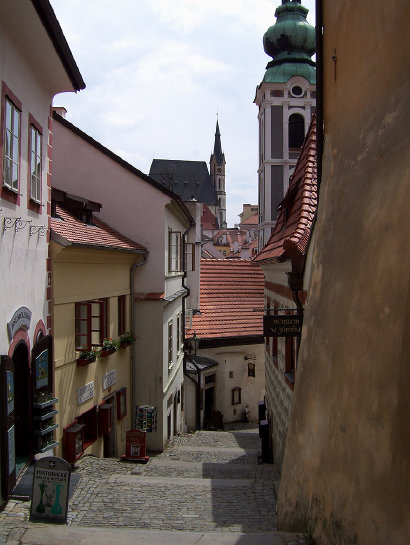
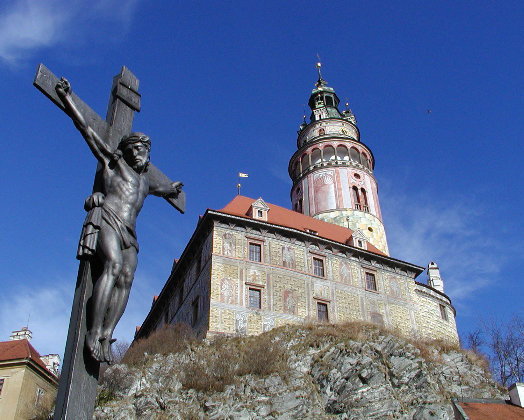
Search
Instagram: @andcusack
Click here for my Instagram photos.Most Recent Posts
- Burns Tower April 19, 2024
- Patrick in Parliament March 18, 2024
- Articles of Note: 13 March 2024 March 13, 2024
- Cambridge March 9, 2024
- Taken on Trust March 4, 2024
Most Recent Comments
Book Wishlist
Monthly Archives
Categories



Thank you, Cusack, for some splendid photos of my favourite castle in all the world. I can assure your readers that it, and the town it dominates, are worth a full day’s detour: no more exhilarating ensemble exists in the whole of Europe.
And Karl Schwarzenberg! A worthy member of Central Europe’s greatest and most consistently talented family. A traditional Catholic too.
Cusack! Perfection!
I fear you are not aware of the current names in the Czech Republic. Firstly all titles were abolished in 1918, and Cesky Krumlov is only described in Czech and not German. The Maldou is known as The Vlatava. You are beinf discourtious to Czechs to use German Names for what are places in The Czech Republic.
True The Schwarzenbergs are afine example of how Noble Families should behave. They have always been Czech and have been very proud of the fact.
William
I trust then that you never use the words ‘Rome’, ‘Moscow’, or ‘Prague’, but always use ‘Roma’, ‘Moskva’, and ‘Praha’?
Czech names are Czech, German names are German, and English adopts toponyms from other places varyingly. German toponyms tended to be adopted for places in Central and Eastern Europe because of the historical political dominance of German-speaking regimes (e.g. the Hapsburgs) and because they are easier for English-speaking people to pronounce.
Dear Mr Cusack,
I fear you do not understand central Europe and or its history.
One is being rude when you refer to a Town in Czechia by its German name. They do not speak German but Czech. To understand their problems you have to delve into Czech History for at least 500 years and more recently the Benes Decree’s and post 1920 Republic.
They do not describe New York by its Czech Name of New Yorku outside The Czech Republic.
I was nearly pointing some things out as I do not like to offend people.
Regards
William Higginson
Dear Mr. Higginson,
Again, I don’t speak Russian, but I’ve never met any Russian who was offended when I referred to their capital as ‘Moscow’.
You mention that they do not describe New York by its Czech name of New Yorku outside the Czech Republic. But surely, if they were speaking Czech abroad, they would, wouldn’t they? Spanish New Yorkers call New York ‘Nueva York’ when speaking Spanish, and call it ‘New York’ when speaking English, and this seems entirely appropriate.
Should I ever learn the Czech language (which certainly has a certain beauty to it), I would of course refer to Krummau on the Moldau while speaking Czech as ‘Český Krumlov’. But when I am speaking English, it will remain ‘Krummau on the Moldau’, just as ‘Moskva’ remains ‘Moscow’ in English.
Best,
Dear Mr Cusack,
I take your point in your latest reply.
But really it is common good manners not to speak of Cesky Krumlov in German to a Czech Audience. You should be aware of The Sudetenland problems of the first half of the 20th Century. You should not try to give rise to these problems again.
As I mentioned in The Czech Republic in 1918 titles were abolished by the government. I am, sure if you asked Karel Schwarzenberg should you call him Prince or one of the other old titles that he might have had, should the Czech Government not abolished them. Karel Schwarzenberg would I am sure reply “Schwarzenberg is good enough for me”. He and his family have much respect from the Czechs and he and his family are and have always been very good and loyal Czechs.
For your interest, they were one of the very few Noble Families that ever spoke Czech,most of the other Noble Families conversed in German even to Czechs. It was even law to speak German to obtain a railway ticket,In The Sudetenland it was not uncommon to see signs in Hotels and Resturants that said “Czechs and Dogs not served”. So perhaps you will understand the Czechs difficulty with the German Language. Some members of The Schwarzenberg Family were imprissioned for being loyal Czechs during WW II. It was said that on Hitlers Birthday they flew Black Flags from their Castles. In Viden (Vienna in English and Wien in German), Jews were banned form Public Places and Parks. The Head of the Schwarzenberg family then put sign up at the entrance to his palace gardens “Everybody including Jews Welcome”.
It appears to me that you need to do some reading up on history of central europe. Another point I should like to raise with you, why in heavens name should you ask people to contribute to you personally. Why not be like everybody else work for a living instead of trying to live off the riches of others.
It would be better to earn your own money, not only does it give you pride in yourself, but it would also mean that you could if you have sufficent help do some charitable work. Instead of hanging on the coat tails of Noble Orders to which you will never be accepted.
Yours truly,
William Higginson
“It appears to me that you need to do some reading up on history of central europe.”
Again, I would like to emphasize that because someone disagrees with you, it does not mean that they are ignorant. Sometimes well-informed, intelligent people simply disagree. If you can’t accept that, it says more about you than about me.
“Why not be like everybody else work for a living instead of trying to live off the riches of others.”
Now you are simply being insulting out of your own pure ignorance. If I need to do some reading up on the history of “central europe”, then you certainly need to do some reading up on the impoliteness of making ignorant assumptions about others. What would your mother say if she knew you were doing such things?
How is it that a man calling himself “William Higginson” writes English so badly?
I do have a good Schwarzenberg story: when Austria abolished titles the then Prince (whether of the senior or the junior line I do not know) looked up from his morning paper and simply remarked “How sad for Herr von Mueller”.
A Schwarzenberg doesn’t need a title.
“William Higginson” should not only improve his command of the English language but even more urgently, his command of Central European history! “Mr. Higginson’s” understanding of the fascinatingly complex history of this important and beautiful region is apparently rather severely impaired by a naive acceptance of a radical revisionist history posited several decades ago by only the most ultra-nationalist Czechs and almost universally discredited today by unbiased historians. As such, his revisionist views on Krummau (and much of Czech history I presume) necessitate adopting a pseudo-intellectual disregard for commonly accepted geopolitical, cultural/socio-economic and demographic historical realities.
Not only was Krummau-an-der-Moldau a German town from its founding until it was unjustly taken from Austria as a result of the armistice signed (November 1918) by all belligerent nations during WWI (and the Treaty of Versailles, which followed), demographic analysis reveals that the German population (before being annexed to Czechoslovakia) never fell below 85%, with that of the Czech inhabitants never exceeding 15%. In fact, had President Wilson principles of self-determination been applied equitably (i.e. even to Germany and Austria-Hungary, instead of simply being applied with a glaring bias in favour of those minority groups living within the borders of both the German and Austro-Hungarian empires, as a thinly-veiled excuse to wrongly seize significant territory from both of the Central Powers) across all of Europe, Krummau would never had been allowed to be claimed by the Czechs. In fact, much of the “Sudetenland” would have remained with Germany or Austria, respectively, which historian of repute acknowledge may have substantially altered many key events (and actions taken by Hitler’s Greater Germany) that precipitated WWII….
So, not only is Krummau the correct reference in the English language for the reasons mentioned by Andrew Cusack, but moreover, a proper, unbiased understanding of the history of Krummau supports, if not requires, a reference employing its German name.
Cheers,
–Prof. John Worthington